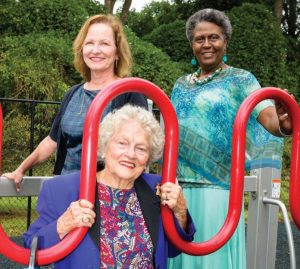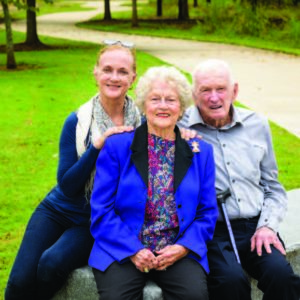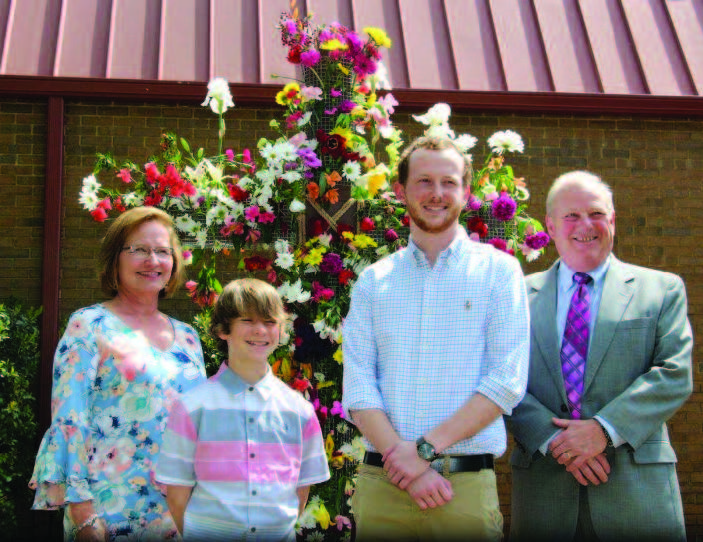
“What am I going to do? I have loved him all my life.” I didn’t know what to say, my mother wasn’t really asking me. My father, Gordon, 83, has Parkinson’s and he wasn’t doing very well. Mother, Margreate, also 83, who has been fighting my father’s disease since before he had been diagnosed, was scared.
They have both fought it. With the help of family, friends, support groups, and water aerobics, they have kept him mobile and active for 21 years after the diagnosis.
“Originally the diagnosis was a relief,” says my sister Deanna. “We knew something had been going on for 5 years – brain cancer was a big fear. But, so many people had come out with Parkinson’s – the Pope, Michael J. Fox, Mohammed Ali. It didn’t seem as scary. He also started mending relationships.”
It is not the retirement Mother had envisioned. She is very active and loves to travel, but Daddy is embarrassed because he can’t move quickly, and he falls down a lot. He hates a fuss being made and, when he falls in public, strangers rush to help.

Arlene, Margreate and Gordon
Mother says, “The hardest thing is watching Parkinson’s take more and more. But we fight it every step of the way.” They go on.
She keeps him active, always including him in decisions and discussions, keeping a “Honey Do” list for him, making him exercise, dragging him out to events. Staying stimulated socially has been harder for them as their friends have died, but Mother does her best.
They were very active in the Athens Parkinson’s support group until it disbanded because everyone else in the group who was diagnosed around the same time, had died. This has made a major difference, but they are still active in the Emory support group. They also have been active participants in every Emory study they could join, from dancing the tango and mobility exercises to speech therapy.
Daddy also volunteered to be one of the first to undergo deep brain stimulation. It was a success and made a big difference in alleviating the symptoms. But Parkinson’s keeps marching on.
For Daddy the hardest thing has been losing his independence.
“I can’t do the things I used to.” He hates being dependent, hates being told what to do, however nicely. “Just leave me alone!” But we can’t.
Once, when sitting in the car some people walked by and Daddy said, “Look at them. They walk like it was nothing.”
He walks with a cane, two canes, or a walker. If he needs to get around our rural property, he jumps on the Kubota Zero Turn and zips around where he needs to. He has put it in the pond twice but we’re not sure that is entirely the fault of the Parkinson’s.
Daddy also has a tractor he uses to bush hog, but he doesn’t drive that much anymore, having had a couple of close calls, none of which he admitted to until long after. He had fallen off, luckily into a ditch, and the tractor had rolled over, but not on, him.
Mother worries when he is out of sight. She doesn’t like to leave him, even when someone else is there. Getting a pedicure or a haircut is the longest she can stand to be away. He now has a Tile tracker on his key chain so she can locate him with her phone.
Love at first sight and for the long haul
They met when they were 13. Daddy knew right away, but “It took me 8 years to talk her into it.” They married at 21 and had their first child at 23.
He worked for the U.S. department of agriculture for over 25 years, and then owned hydroponic greenhouses. They think it was probably the pesticides he was exposed to that brought on the Parkinson’s. There were warning labels and protective equipment, but he didn’t wear it. He remembers standing out in the fields, many times, watching the crop dusters fly over. But you can’t look back, you can only go on.
And they do go on. They still love each other very much, and it shows. He gets frustrated and aggravated at her sometimes, she gets frustrated and aggravated that he is frustrated and aggravated at her. They both think the other needs to talk louder.
At the dinner table there is a constant, “What did he say? What did she say? Daddy speak up, I can’t understand you.” But they go on.
They are an example, to everyone who sees them. More than once someone has bought their dinner while they were out. They still hold hands, they still kiss, they still flirt. Daddy did make the mistake of telling Mother that she might need to lose a few pounds. She has only mentioned it two or three times a day since. They are still a couple, Mother makes sure of it.
When mother fractured her femurs and was at the hospital and nursing home for six weeks, Daddy slept there. We would take him home for a few hours to change clothes and shower, but then he would go right back. When she was more mobile, you could see them going down the hall of the nursing home, both in walkers, together, side by side.
The Sandwich Generation
You would never guess, from looking at her, what Jackie Bishoff’s life has been like over the past year. An only child, Jackie, 56, with two sons and a husband in the house, and a mother just down the road, is a member of what has been called the “Sandwich Generation.”
Squeezed between minor children and aging parents who may be ill or in need of financial support, the Sandwich Generation is increasing in numbers because of longer life spans and the trend of delaying children until later in life. But when you add a spouse with cancer into the mix, it rapidly goes from a “sandwich” to a seven-course meal with optional aperitif.

Jackie and her family
Jackie’s husband, Brad, was diagnosed and undergoing treatment for lung cancer at the same time her mother, Libby, 87, was diagnosed with slow growing breast cancer. Last February, everything took a sharp turn for the worse. Brad had successful surgery to remove a tumor but three days later, had a brain bleed. The emergency surgery left him speech impaired and paralyzed on his left side.
“And in the middle of all this, my mother’s issues escalated,” said Jackie. “At one time they were side by side in the emergency room.”
For almost two months, Brad was either in the hospital with some complications or at trying to recover at rehab. He wasn’t impaired mentally; he understood everything said but he couldn’t form words, he couldn’t read, he couldn’t write. Since he couldn’t walk, he had to be lifted and carried. What they thought was going to be a temporary caregiving situation had turned into a full-time job. And Jackie already had one of those – she’s Group President and Trust Officer with First American Bank. Luckily, her employer has a family leave policy.
It’s been a costly interruption that’s been made easier by disability checks from Brad’s employer, minimizing the amount they’ve had to withdraw from savings to pay for full-time caregiving. They also had a cancer insurance policy.
“He had a lot of setbacks in the beginning,” Jackie says. “But he is progressing. Now he is doing outpatient therapy, and the last four weeks he has made tremendous gains.”
Juggling absolutely everything
Meanwhile, her mother’s cancer has metastasized to her back and bones so she is no longer taking any medication nor seeing an oncologist. She’s under palliative care and has had a couple of procedures that gave her physical relief. Once the pain was under control, her appetite returned, and she seems to be doing very well.
Libby doesn’t need a caregiver yet, and between Jackie, her younger son William, and a woman from her church who stops by frequently, she’s getting daily social support. Her house is tiny so it’s easy for her to get around.
Eventually, depending on her mother’s situation and her need for full-time care, Jackie plans to move her into the mother-in-law suite in her house, which is the only affordable option for Libby.
For now, everything is looking up. The prognosis is good for Brad. “They said a minimum of a year, but it has been 7 months and we suddenly seeing this breakthrough. We actually have conversations now.”
“There are only four kinds of people in the world. Those who have been caregivers. Those who are currently caregivers. Those who will be caregivers, and those who will need a caregiver.
Rosalynn Carter “
For Jackie juggling has been the hardest thing. “Juggling everywhere I need to be, everybody that needs me. … My youngest son is 15… I am probably the only parent out there saying, ‘Thank god for X-Box.””
As a trust manager who has set up and managed many trusts plus help from a co-worker, who had undergone a similar situation and who had also worked for several assisted living facilities, Jackie has been able to get the information and resources she needs.
“When he was in the hospital all that time, all my neighbors pitched in and every Monday they would bring two meals to the house. After he got home, the church stepped in and would bring the two meals…If you don’t have a support system you are really in trouble.”
“It has been an interesting journey. I had many, many breakdown moments. I would just have a big ole’ cry, and then you just go on.”
Caring for mother
Ten years ago, when she was 77, Louise Johnson’s family noticed a change. She couldn’t remember her grandchildren, and her driving was erratic.
“We tried herbs,” recalls her daughter, Athens resident, Clara Ham Daniel, but when that didn’t work, she and her sisters decided it was time to take their mother, to a neurologist. The unhappy diagnosis was Alzheimer’s.
Hartwell is home to the family so for the first few years, Clara’s sisters took care of their mother but about six years ago, she began to need more care. Clara, now 60, was retired and had more time than the others.

At right, Clara Ham Daniel, full-time caregiver. Her family, with Louise in the center, makes caregiving easier.

Louise Johnson
Louise moved in with Clara, and Clara cut short her studies at Athens Tech. “She needed me more than the school did.”
In the beginning, Louise could dress herself, but not now. She could no longer cook by the time she moved in with Clara, but now, Clara cuts her food and talks her through eating. Clara has installed a keyed dead bolt lock to prevent Louise from wandering off.
The family had agreed to have Louise participate in a study for a potential new drug. It turned out that Louise was on the infusion drug but brain scans showed no improvement.
“We want to do everything we possibly can,” says Clara. While they were concerned about her being “a guinea pig,” they’re glad they did it.
The family spreads around the duties of care, with Louise staying with her daughters in Hartwell on the weekends, and nieces and nephews fill in when needed.
“Sometimes I need a brain break, and when I have a crying spell, I can call one of them to come over,” says Clara.
Mornings, Louise now goes to the Bentley Center, the adult daycare center at ACCA. Most recently, she can’t wind down at night and pulls clothes out of her drawers. Clara is often up in the middle of the night at 3 or 4 o’clock, and can have several nights in a row without much sleep.
“She was a nurse’s assistant and cared for others,” Clara says. “The acceptance of not having Mother as she once was, cooking, caring, in charge, taking care of business, was tough.”
“We hug coming and going, and she tells me she loves me. We can’t have all the talks or do all we used to do, but I’m just so thankful to have her.”
Caring for siblings

Susan Brown manages the medications for herself, her sister and her brother.
Susan Brown, 69, began her caregiving journey in 2010. She had three small rental houses she’d bought in the 1970s so when her never-married sister, Lyn, then 72 and now 80, began to have health problems, it was natural to invite her to move down from Chicago into one of the houses. This, although they hadn’t been close growing up because of the age difference.
At the same time, her brother Patterson, then 65, long divorced, and living in Atlanta, began to experience the early signs of dementia. She moved him into one of the other houses.
Divorced with two teenagers and working as a special education teacher, Brown began the complex and time-consuming task of caring for two adults with significant health issues, including congestive heart failure, high blood pressure, and atrial fibrillation. Lyn also has debilitating back issues and Patterson has Tourette’s Syndrome in addition to several other psychiatric disorders.
Issues: Food and falling
In the beginning, Brown lived in a tri-level house in the Glenwood neighborhood. While she hired someone to do grocery shopping for them, each was managing their own meals. And that created a big problem.
“He swelled up terribly so I took him to the doctor,” recalls Brown. “When the doctor asked what he was eating, he said ‘hot dogs.’” In fact, he would eat hot dogs, morning, noon and night, Brown discovered. Sodium was the culprit. Lyn, who couldn’t cook anymore, was eating processed, microwavable meals that looked well balanced but were also highly seasoned with salt .
And Lyn was becoming more unstable, once calling her sister in the middle of the night, having fallen and unable to get up. Somehow, Brown got the front door unlatched, and in retrospect, “I got her up but don’t know how I did it.”
Following more middle-of-the-night phone calls, and the puzzle of overseeing healthy meals, it all came to a head in 2016 when it became clear the tri-level house couldn’t be renovated to accommodate everyone’s needs. Luckily, by tearing down two of the rental houses, one lot was created for a single-story, handicapped-friendly house that was finished last year. Now, Brown, who retired in 2015, oversees the care of both siblings in one place. Her schedule is filled with numerous doctors’ appointments (Patterson is under the care of eight different specialists), medication management, and meals, which are the hardest because Brown says she “doesn’t like to cook.” On weekends, she takes care of laundry, cleaning, and grocery shopping. Her sentiments are straightforward: “This is not what I had planned for my retirement.”
What helps
Brown says a one-hour exercise class at the YMCA twice a week, line dancing at the Athens Community Council on Aging (ACCA) once a week, and pickleball at Lay Park “save my sanity.” She’s also signed up for 12 OLLI classes this semester. And each evening at 8 o’clock, she closes her bedroom door and takes time just for herself.
“It’s going to get harder – Patterson is starting to wander.” What will she do? She says, she’ll seek out answers at ACCA.![]()
Caregiving, part 2
Resources, future challenges, and how immigrant cultures handle caregiving





Reader's Comments
If possible, will you please report that there is a Parkinson’s Disease Support Group that meets on the first Friday of each month at 1:00 pm. The meetings are held in the Presbyterian Student Center on 1250 S. Lumpkin Street in Athens. All are welcome!